- Home
- D. H. Lawrence
Selected Stories Page 16
Selected Stories Read online
Page 16
His comrades were assembling in the yard. He put the postcard into his pocket and joined them, laughing. No one would have guessed that his heart was gnawed inside him with apprehension. He moved with indifference and a little abandon, martial also, since he was a soldier. There was something young and conceited about him, something swagger and generous. The men treated him with a familiarity of affection, but they handled him rather cautiously for all that. He was easily the most noticeable among them, the most handsome, the best proportioned, quite un-German in his gracefulness of bearing and remark: also a little given to showing off.
Presently the sergeant appeared. He was a strongly-built, rather heavy man of forty. But it was evident he had gone to pieces. His head stuck forward, dropped a little between his straight, powerful shoulders. His face, once handsome and full of character, had relaxed, so that all its lines hung sullenly. The dark eyes were heavy underneath. It was the face of a passionate, ruined, hateful man. His duties were only intervals in his drinking.
He gave his orders briefly, evidently not one to waste words, and the little company moved down the white road. The vines on either side were dusty, the poppies at the edge of the corn blown to pieces, whilst the tall rye bowed deeply, and deeply again, in the wind.
Bachmann walked with his usual ease. His comrades had a manner of marching head-first, something like bears. He had none of that dogged submissiveness, but went easily when he was not tired, and then his shoulders, not his head, went slack with fatigue.
Now he was afraid. At the very core he was gnawed with a shame of fear. He knew the taciturn officer disliked him, and more or less saw through his braggadocio. He was afraid of the climbing. He could not bear to be at a height. It made his bowels melt, and his limbs turn to water. But there it lay before him, this afternoon, and it had to be done. He had never quite given himself away yet. He was supposed to be a reckless dare-devil. Nor was he afraid, in the water, or fencing with swords. He had accustomed himself to these things since he was a boy. But he was afraid to ride on horseback, and he was afraid of heights. And fear of these things harassed his soul like shame, in company of men. With women it did not matter.
They drew near to the walls of the town, passed down a path among trees, and came to a halt. At their feet, the grass ended in a winding canal of water, whose edge was planted with trees in little thickets. The place was silent except for the rustling of the leaves. In the distance a sentinel was seen occasionally passing through the waving shade and sunlight. Marguerite daisies and the gold of lady’s slipper glimmered peacefully among the mysterious fortifications, in the deep grass. Occasionally, a puff of wind made the grass pale.
The group of soldiers stood at the end of one of the moats, in their light blue and scarlet uniforms. The officer, with his powerful body and miserable face making the young soldier’s heart uneasy, was explaining tersely and brutally. The water was dead still. On the other side of it, the stone wall of a rampart rose again, a low cliff, along whose summit the grass grew and tall daisies stood, showing their form against the dark of the waving trees beyond, overhead. The soldiers felt dwarfed, down in face of the ramparts. Still and lush and mysterious the place was, gloomy with trees. And penetrating to this silence came the run of tramcars and the noise of the town, a hundred yards away.
Bachmann’s heart was beating as he listened to the terse but not very intelligible instructions of the officer. Then the practice began. One man had to take the ladder along the stone ledge at the foot of the wall, over the water, and, fixing it, climb to the land above. Bachmann watched, and it seemed easy. But he felt shaky himself. He had been too long in suspense because of this climbing.
The blue-uniformed figure of the climbing soldier mounted, clambering, grasping, to the height, moved along the edge of the little precipice, and prepared to descend again. It was doing everything according to command, so that it had a blind, unintelligent look about it. Small at the height, blue and scarlet among the intense greenery, it went, apart from everything, with dull feet to the next point, crouched, and began to make ready for the descent. But it was evident from the blind groping of the feet, the tense stiffness of the legs and back, that the body was moving against its own will, almost subjugated, but yet stiff. The sight of it made a flame of rage and impotence and fear go through Bachmann. He trembled slightly. As a rule, when he obeyed, he obeyed himself, identifying his will with that of the authority. Often it cost him a bitter effort, and made his face pale with ignominy. But then, in his soul, he had acquiesced to the great fact of the Army, and so had more or less identified himself with it. Now came the supreme test—whether his will, sufficiently identifying itself with the will of the Army, could control his body. If not—. He stood waiting, the anxiety gnawing in his chest, full of the torture of fear.
His turn came. He knew by some intuitive feeling that the officer had perceived his condition. The sergeant was furious to-day. Occasionally came the long snarl of a man whose blood is disintegrated with irritation. Bachmann went in silence along the ledge at the foot of the wall. He placed his ladder at last successfully, his previous failures having made him the more chaotic and blind. Then he began to climb. The ladder was not firm. At every hitch his heart went molten hot. He hung against the face of the wall in mid-air, in agony pawing to grip the rungs with his toes. If one fell, one would be nicely broken against the ledge, as one dropped into the water. His heart began to melt. Vaguely, he was conscious of the growing space beneath his feet. He clutched the rungs of the ladder with his hands. Things were beginning to spin out of their places. He was sensible to the firmness of the ledge in the space below, but not the firmness of the ladder on which he hung. And he seemed to be reaching to the hardness below. Already he was in mid-air unsupported, so that there was nothing to do but fall. And so—everything went pitching in a sickening swoop. The sergeant’s voice was thundering away underneath. That was nothing. His heart gave another furious, circling swoop, his wrists were melting off, his knees, his ankles going. He would fall. Then a little, hot sensation penetrated to him as in a swoon. His water was running down his leg. He hung on to the ladder in mid-air like a numbed fly, neither able to fall or to mount. Quite still, quite inert, he hung there, shame, like an anæsthetic, having for the moment blotted him out. Perhaps his hands were growing slacker.
The soldiers below had stirred and laughed uneasily. Now they were silent. The officer was yellow with fury. Even he at last was silent. They watched the inert figure, blue and pitiable, cleaving against the wall, just below the broken grass that bristled unconcerned. The officer, in his rage, ran to another ladder and climbed up, giving the men instructions to come after.
Bachmann was just coming out of his swoon of panic. Once again he could feel his wrists and knees firm. Things were taking their places too, as to one who wakes from a nightmare. For a minute they had all dissolved, and there had been nothing but space into which he had hung unsupported, with certainty of the hard ledge far beneath, whose very blow that would break his body would be a panting relief to his soul. Now all things were growing fixed again. Eagerly, he was rousing. In a moment he would be able to grasp the grasses and perform that feat which had paralysed him in awaiting him—climb over the edge of the wall.
But as he reached to clasp the next rungs, large hands seized his wrists, and, in a great gap of fear, he was being hauled over the edge and on to the trampled grass. He lay on his knees. Then slowly, his senses coming to him through a thick daze of disappointment and unconsciousness, he rose to his feet.
The sergeant, panting with rage, his face yellow and livid, stood glaring at him, unable to speak. Bachmann waited, still too stunned to know anything but shame, only feeling a certain flame shoot to his heart, as he was aware again of the contact of the officer’s hands with his own wrists, felt the officer’s strength gripping him and pulling him up. He was bewildered. Then he began to tingle with pitiable rage. He had been climbing up without the officer’s interference. A flam
e went through his heart as he felt again those large hands suddenly grasping and hauling at his wrists, just when he was in motion to succeed of himself. Now—he was a miserable carcass hauled there. A fierce, self-destroying rage possessed him, tempered with hate and self-justification.
He became aware of the low, hissing voice of the officer, a squeezed voice that came from a big panting chest. The sound cut him through with shame. His head hung, he did not hear what was said, only he felt the low, tense flame of contempt and destructive abuse in the other man’s voice. But somewhere in his heart he resisted, he would not give in. Suddenly he started back as if his heart would leap out of his body. The officer, his voice growing louder, had thrust his discoloured face forward into that of the soldier. Bachmann started away; the vision of the sergeant’s face, the open mouth, the upper lip raised from the teeth, the snarling, barking look had shocked him away on the reflex. His heart was pounding, his limbs began to tremble, his nerves felt like fine, white-hot threads. There was a moment of anguished suspense. Then, the voice getting louder, the face of the officer thrust suddenly into his again, the mouth opening and gibbering with words whose noise only he heard, Bachmann starting from it in blind revulsion, was jerking up his arm to protect his face, when his elbow caught the officer’s mouth and nose with a cruel blow. The elder man jumped, staggered backward, and stepped over the edge of the ramparts, while the soldiers sprang forward to stop him. There was a shout, then a loud crash of water.
Bachmann stood impotent with fear. The soldiers broke into movement.
“You’d better run, Bachmann,” said one, in a voice of pleased excitement. The guilty soldier turned and walked down the tree-hidden path into the street.
There, he stood in the sunshine, watching the officers ride by, the soldiers passing, the few civilians sauntering on their errands. He went towards the town. Over the bridge the trams were running. Down below, at the water’s edge, the unequal, old French houses shone gaily in sunshine. The Cathedral was fine, her myriad little pinnacles pricking into the blue sky. Everybody was easy and comfortable, this sunny afternoon. He felt for a moment quite at peace. But he was aware of a great strain in the past—and in the future. He would soon be taken. And he faltered and stood still.
But no, he would not be taken. A wave of revulsion against it all went over him. He would get away. He was himself. Rapidly, he thought of all the places in which he might hide. How heaped with purple the lilac-trees were, how clean the grass and the white walks by the river! He could not think. There was nowhere to go. It was a beautiful afternoon. He felt dark. It seemed to him curious the soldiers riding by so negligently should not notice him; that he was conspicuous like a man in a black cloak.
Perhaps it would be easier to go back to the barracks and take his punishment. He did not care what they did to him.
But then his heart hardened itself. He did care. He hated them all. They did not give him a chance to be himself. He hated the army. It had trampled him when he was willing and had made him ashamed. Why should he give in to the army any more? Why should he let it put him to prison? He was himself.
But then, how could he help himself? There was only his mother. Ah, what a shame for her! And he could not help it. He hated the army, the uniform he wore, the very movement of an officer’s steed. And everybody would be against him—everybody. Each one of the common soldiers would be there to lay hands on him. And what for?—for nothing. In a dazed heaviness he walked along. Everywhere was militarism—there was no getting away from it. France! America! suddenly he caught at the idea of another land. He wanted to be in America. To be in a foreign land would be to be himself again.
II.
There was no way out—no way out. He was walking just blindly nowhere. Yet it was only forty miles to France. He took the next bridge across the river. Soon the order would be given for his arrest. He knew it was quite hopeless to think of escape. He was too much alone.
His heart gave a sudden leap and stood still. There was Emilie. If he hid till night, then he might get away over the border. Emilie was a servant at the Baron von Freyhof’s, at the big house half a mile away from his own barracks, and not more than two miles out of town. Yet it was quite in the country. He would go there. It was a chance. By taking the Scy tram, he would not have more than a mile to walk, across the fields. And soldiers were so common.
He got into the small, quick-running tramcar, all eager now to come to Scy and to Emilie. He felt he could trust her. She was proud and reserved. Once she had walked to town with him, and at evening he had talked to her in the courtyard of the Baron’s house. At any rate, he would go there. He had a feeling that it was right.
He got out of the tram at the terminus and took the field path. The wind was still blowing, but not so strongly. He could hear the faint whisper of the rye, then the long swish-swish as a stronger gust came. The vines smelt sweet to him. He liked their twinings and the tender look of the young shoots. In one of the fields men and women were taking up the hay. The bullock-wagon stood on the path, and the men in their blue shirts, the women with white cloths over their heads, carried the hay in their arms to the cart. He was thinking of his own village. There the hay was being cut. It was a still, beautiful sight to see the sun on the shorn grass, and on the movement of the harvesters.
The Baron’s house stood square and grey in its big garden, among the fields. Across, he could see the low swarm of the barrack’s buildings. He did not hesitate, but walked as Fate led him, to the courtyard entrance of the house. The dog, Peter, seeing a soldier, only danced. The pump stood peacefully in the shadow. Everything was still.
The kitchen door was open. He hesitated, then walked in. The two women started. Emilie had just lifted the coffee-tray. She stood, questioning and superb, fronting him across the room. She was very dark, with closely-banded black hair, proud, almost cold grey eyes, and the faint shadow of hair darkening her upper lip. She wore a peasant’s dress of bright blue stuff with little reddish roses scattered over it. The silver, and the white and rose of the coffee-service, shone in her hands. The outline of her firmly-covered breasts showed distinctly. She stared at the young soldier.
A look of recognition, of question devoid of feeling was in her eyes as they rested on him. He was aware of the nursery governess sitting at the table picking a dusky heap of cherries. She was a young woman of about twenty-five, pale, freckled, pretty, dark-haired. Her dark eyes were looking questioningly at him; she had a pleasant but rather hard face.
He went pale, meeting Emilie’s challenging stare, and felt rather dreary. It was harder than he thought, appealing here. He was half-minded to turn and go again. But Fräulein Hesse looked kind and attentive. Bachmann seemed to feel the open courtyard behind him like an exposure.
“I had a go with Huber,” he said, slowly, his tall, graceful body leaning slightly forward, his blue eyes strained and trying to smile. Emilie’s inquiring look, shy eyes and haughtily defensive bearing, made it hard for him.
“How do you mean?” she asked, half-audibly.
“I knocked him down the fortifications—partly by accident—and ran.” He looked at her rather vaguely. It was all so mechanical.
“You what!” cried Fräulein Hesse, rising dismayed and capable from her chair. Emilie stood unmoving. He glanced at the governess for support. But he felt the steady, hard grey eyes of Emilie watching him. And somehow, it was to this woman he belonged. Beautiful she looked, too, in the blue dress tightly covering her breasts, straight and proud in her bearing. She was still waiting for him. It was like judgment.
“I thought perhaps I might hide for a night, and then get away to France,” he said. And for the first time his blue eyes met those of Emilie, and he looked back at her, straight into her. It made him suffer too. He wanted something to back him up. Slowly, she lowered her eyes.
“Yes,” she said, as if she had not understood, and turned away, going through the inner door with the tray. He watched her proud, straight back, her st
rong loins, the thick, black plait of hair bound round her head. She was gone. He felt lost and forsaken.
“They are having coffee in the garden,” said the governess, “and the children are there. What did it do to him?”
He looked at her quickly. But she was gazing direct at him, thinking, waiting.
“I don’t know,” he answered, rather bitterly. Seeing the cherries lying near him, he took a handful and began eating them, slowly. Fräulein Hesse regarded him, half wondering. Accustomed to the atmosphere of soldiers, she was at a loss for the moment.
“And what happened?” she said.
“He was ragging me. You’ve seen him push his face into yours and you mustn’t move. I couldn’t keep still. I put my arm up to keep him off and it caught him, and he fell down the fortifications.” The young soldier had become an actor at once. He went through the scene with vigorous gestures, his blue, rather full eyes staring. Fräulein Hesse watched, fascinated. He finished, and began to stroke his reddish moustache.
“You don’t know what it did to him?”
“Might have killed him—I don’t know,” he replied, looking at her as if calmly submissive to fate. He had rather a beautiful, abandoned pose. Nevertheless, he was gnawed with anxiety to know how much the officer had been hurt. But he kept his thoughts from the question—it was too disturbing. Fräulein Hesse stared at him, her face full of wonder and speculation. Emilie returned. She closed the door behind her, then went and closed the outer door. He continued to sniff the scent of coffee, wishing for a drink, while he ate cherries thirstily. Something was steaming on the stove. The enamel pans shone blue on the wall. He felt a little bit out of place, as if he were acting some part. The pans hung so easy and natural. And he waited for the two women to dismiss his fate.
“Where can you go?” asked Emilie, in her subdued, meaningless voice. He, helpless, looked up at her. She stared a moment at him, then at Fräulein Hesse. Her colour came, and she shrank slowly away from him, lowering her eyes, unable to speak. He looked at Fräulein Hesse. Her eyes were roused. They looked straight into his with a kind of smile. She was taking lead for him, and seemed to communicate with him privately.

 Look! We Have Come Through!
Look! We Have Come Through! Women in Love
Women in Love The Ladybird
The Ladybird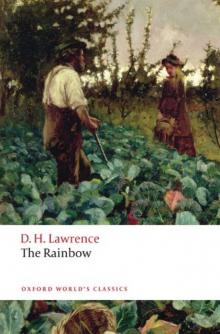 The Rainbow
The Rainbow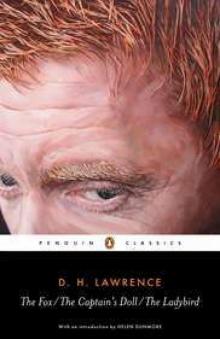 The Captain's Dol
The Captain's Dol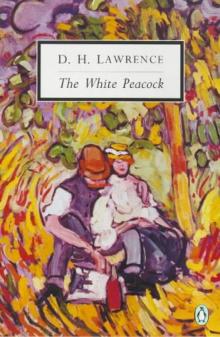 The White Peacock
The White Peacock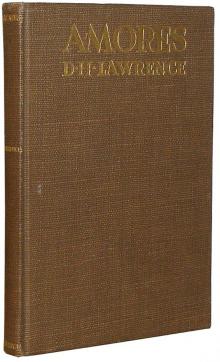 Amores
Amores Lady Chatterley's Lover
Lady Chatterley's Lover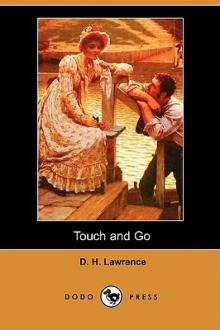 Touch and Go
Touch and Go The Wintry Peacock
The Wintry Peacock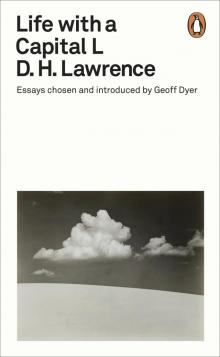 Life with a Capital L
Life with a Capital L The Lost Girl
The Lost Girl Sons and Lovers
Sons and Lovers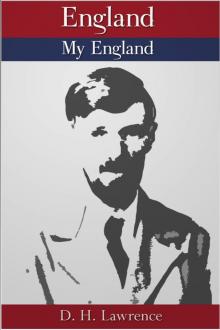 England, My England
England, My England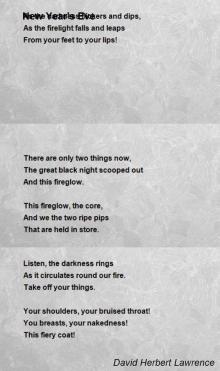 New Poems
New Poems Twilight in Italy
Twilight in Italy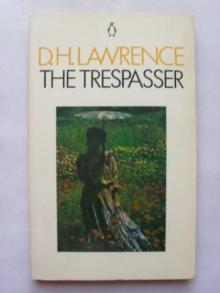 The Trespasser
The Trespasser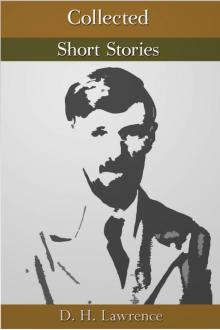 The Collected Short Stories
The Collected Short Stories The First Lady Chatterley's Lover
The First Lady Chatterley's Lover Kangaroo
Kangaroo Bay
Bay Complete Works of D.H. Lawrence
Complete Works of D.H. Lawrence D H Lawrence- The Dover Reader
D H Lawrence- The Dover Reader The Rainbow (100th Anniversary ed.)
The Rainbow (100th Anniversary ed.) The Prussian Officer
The Prussian Officer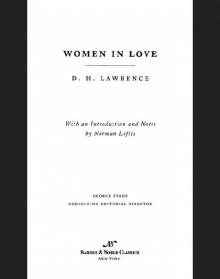 Women in Love (Barnes & Noble Classics Series)
Women in Love (Barnes & Noble Classics Series) John Thomas and Lady Jane
John Thomas and Lady Jane The Bad Side of Books
The Bad Side of Books Sons and Lovers (Barnes & Noble Classics Series)
Sons and Lovers (Barnes & Noble Classics Series) Selected Stories
Selected Stories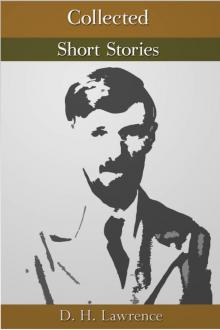 Collected Short Stories
Collected Short Stories Complete Works of D.H. Lawrence (Illustrated)
Complete Works of D.H. Lawrence (Illustrated)